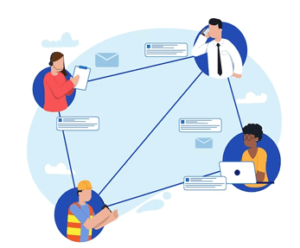What's Inside?
What is affiliate marketing?
Affiliate marketing is a performance-based marketing strategy where a company (merchant) pays a commission to an individual or a third-party website (affiliate) for promoting its products or services.
Affiliates promote the merchant’s products or services on their website, blog, social media, or other platforms. When a customer clicks on the affiliate’s link and makes a purchase, the affiliate earns a commission on the sale.
Affiliate marketing is a cost-effective way for merchants to reach a wider audience and increase sales, while affiliates can earn passive income by promoting products they believe in. It is a win-win situation for both parties, and it has become a popular way for individuals and businesses to monetize their online presence.
Types of Affiliate Marketing
There are several types of affiliate marketing, including:
- Pay-per-sale (PPS): This is the most common type of affiliate marketing. With PPS, the affiliate receives a commission when a sale is made through their unique affiliate link.
- Pay-per-click (PPC): In this model, the affiliate earns a commission each time a visitor clicks on their affiliate link, regardless of whether or not a sale is made.
- Pay-per-lead (PPL): With PPL, the affiliate is paid a commission for each lead they generate for the merchant, such as when a visitor fills out a form or signs up for a free trial.
- Two-tier affiliate marketing: This type of affiliate marketing allows affiliates to recruit other affiliates and earn a commission on their sales.
- Multi-level marketing (MLM): Similar to two-tier affiliate marketing, MLM allows affiliates to recruit other affiliates and earn a commission on their sales. However, MLM also allows affiliates to earn a commission on the sales of affiliates that their recruits have recruited.
The type of affiliate marketing program that is best for an individual or business will depend on their goals, resources, and target audience.
How does affiliate marketing work?
 Affiliate marketing typically works as follows:
Affiliate marketing typically works as follows:
- An affiliate joins an affiliate program: The affiliate finds a merchant with a product or service they want to promote and joins their affiliate program.
- The merchant provides the affiliate with unique tracking links: The merchant provides the affiliate with unique tracking links to use in their promotions, which allows the merchant to track the traffic and sales generated by the affiliate.
- The affiliate promotes the merchant’s products or services: The affiliate promotes the merchant’s products or services on their website, blog, social media, email marketing, or other platforms, using their unique tracking links.
- A customer clicks on the affiliate’s tracking link: When a customer clicks on the affiliate’s tracking link and makes a purchase on the merchant’s website, the affiliate earns a commission on the sale.
- The merchant tracks and pays the affiliate: The merchant tracks the affiliate’s referrals and pays them a commission on the sales generated by their promotions. The commission rate and payment terms are typically defined in the affiliate program agreement.
- The affiliate monitors their performance and optimizes their promotions: The affiliate can track their performance, optimize their promotions, and adjust their strategies to increase their earnings.
Affiliate marketing is a performance-based model where both the merchant and the affiliate benefit from the affiliate’s promotional efforts, as the affiliate earns a commission on sales generated by their promotions, while the merchant increases their sales and reach.
How to get started with affiliate marketing
To get started with affiliate marketing, you can follow these steps:
- Choose a niche: Select a niche that you are interested in and passionate about, and that has profitable affiliate programs.
- Choose an affiliate program: Research and select an affiliate program that offers products or services that align with your niche and audience. Look for programs that offer high commission rates, good tracking, and reliable payments.
- Create a platform: Create a platform to promote the affiliate products, such as a website, blog, social media, or email marketing.
- Create high-quality content: Create high-quality and engaging content that provides value to your audience and includes affiliate links.
- Drive traffic: Drive traffic to your platform using various methods, such as SEO, social media marketing, paid advertising, or guest blogging.
- Monitor and optimize: Monitor your performance, track your conversions, and optimize your promotions to improve your results.
- Follow the rules: Ensure that you follow the guidelines and regulations of the affiliate program and disclose your affiliate links to your audience.
Affiliate marketing requires time, effort, and dedication to build a successful business. However, with the right strategies and tactics, affiliate marketing can be a lucrative source of passive income.
Why should you do affiliate marketing?
There are several reasons why you might consider doing affiliate marketing, including:
- Passive income: Affiliate marketing can be a source of passive income, meaning you can earn money without actively working on the promotions all the time.
- Low start-up costs: Affiliate marketing requires minimal start-up costs, as you don’t need to create your own product or service.
- Flexibility: Affiliate marketing allows you to work from anywhere and at any time, as long as you have an internet connection.
- No inventory or shipping: As an affiliate, you don’t need to worry about inventory or shipping, as the merchant takes care of those aspects.
- Scalability: Affiliate marketing offers the potential for scalability, meaning you can reach a larger audience and earn more money by scaling your promotions and increasing your traffic.
- Monetize your online presence: If you have a website, blog, or social media following, affiliate marketing allows you to monetize your online presence and earn money from your audience.
Affiliate marketing can be a great way to earn passive income and monetize your online presence, while offering flexibility, scalability, and low start-up costs. However, it requires time, effort, and dedication to build a successful business.
Is affiliate marketing worth it?
 Whether or not affiliate marketing is worth it depends on several factors, including your goals, resources, and dedication to the business. Here are some of the pros and cons to consider:
Whether or not affiliate marketing is worth it depends on several factors, including your goals, resources, and dedication to the business. Here are some of the pros and cons to consider:
Pros:
- Passive income: Affiliate marketing can be a source of passive income, allowing you to earn money without actively working on the promotions all the time.
- Low start-up costs: Affiliate marketing requires minimal start-up costs, as you don’t need to create your own product or service.
- Flexibility: Affiliate marketing allows you to work from anywhere and at any time, as long as you have an internet connection.
- No inventory or shipping: As an affiliate, you don’t need to worry about inventory or shipping, as the merchant takes care of those aspects.
- Scalability: Affiliate marketing offers the potential for scalability, meaning you can reach a larger audience and earn more money by scaling your promotions and increasing your traffic.
Cons:
- Competition: Affiliate marketing is a competitive industry, meaning there may be many other affiliates promoting the same products or services as you.
- Revenue fluctuations: Affiliate marketing earnings can fluctuate based on factors such as traffic, seasonality, and changes to the merchant’s commission structure.
- Merchant control: As an affiliate, you don’t have control over the product or service being promoted, the merchant’s website, or the sales process, which can impact your conversions.
- Dependence on merchant: Affiliate marketing success relies on the merchant’s reputation, product quality, and customer service, which can impact your earnings.
Affiliate marketing can be worth it if you have a clear strategy, a target audience, and the dedication to build a successful business. However, it requires time, effort, and constant optimization to succeed, and there are risks and challenges to consider.
Why is affiliate marketing a good business model?
Affiliate marketing is a good business model for several reasons:
- Low start-up costs: Affiliate marketing requires minimal start-up costs compared to other business models, as you don’t need to create your own product or service.
- No inventory or shipping: As an affiliate, you don’t need to worry about inventory or shipping, as the merchant takes care of those aspects.
- Passive income potential: Affiliate marketing can be a source of passive income, meaning you can earn money without actively working on the promotions all the time.
- Scalability: Affiliate marketing offers the potential for scalability, meaning you can reach a larger audience and earn more money by scaling your promotions and increasing your traffic.
- Flexibility: Affiliate marketing allows you to work from anywhere and at any time, as long as you have an internet connection.
- Diversification: Affiliate marketing allows you to promote multiple products or services, diversifying your income streams and reducing the risk of relying on a single product or service.
- Performance-based: Affiliate marketing is a performance-based model, meaning you only earn commissions when a sale is made, incentivizing you to optimize your promotions and increase your conversions.
Affiliate marketing is a good business model that offers low start-up costs, passive income potential, scalability, flexibility, and diversification, while incentivizing you to optimize your promotions and increase your conversions. However, it requires time, effort, and dedication to build a successful business.
How much money do affiliate marketers make?
The amount of money that affiliate marketers can make varies widely depending on a variety of factors, including the affiliate program they are promoting, the commission structure of the program, the products or services being promoted, the target audience, the traffic sources, and the level of effort and dedication put into the promotions.
Some affiliate marketers make a few hundred dollars per month, while others can earn six or seven-figure incomes per year. According to a survey by Rakuten Marketing, the average affiliate marketer earns around $36,000 per year, but top-performing affiliates can earn well over $100,000 per year.
It’s important to note that affiliate marketing is not a get-rich-quick scheme and requires time, effort, and dedication to build a successful business. The earnings can be passive, but it takes work to set up and optimize promotions, generate traffic, and build a loyal audience.
The earning potential of affiliate marketing is significant, but it depends on many factors and requires a long-term strategy and commitment to building a successful business.
Affiliate marketing tools
There are many tools and resources available to help affiliate marketers optimize their promotions, track their performance, and increase their conversions. Here are some common affiliate marketing tools:
- Affiliate networks: Affiliate networks such as Amazon Associates, Commission Junction, ShareASale, and Rakuten Marketing provide access to a wide range of affiliate programs and products to promote.
- Affiliate tracking software: Affiliate tracking software such as Post Affiliate Pro, iDevAffiliate, and AffTrack help affiliates track clicks, conversions, and commissions.
- Keyword research tools: Keyword research tools such as Google Keyword Planner, SEMrush, and Ahrefs help affiliates find profitable keywords to target in their promotions.
- Landing page builders: Landing page builders such as ClickFunnels, Leadpages, and Unbounce help affiliates create high-converting landing pages to promote products and services.
- Email marketing software: Email marketing software such as Mailchimp, ConvertKit, and Aweber help affiliates build and nurture email lists to promote products and services.
- Analytics tools: Analytics tools such as Google Analytics and Hotjar help affiliates track website traffic, user behavior, and conversions.
- Social media management tools: Social media management tools such as Hootsuite, Buffer, and Sprout Social help affiliates manage their social media accounts and track engagement and conversions.
Affiliate marketing tools can help affiliates optimize their promotions, track their performance, and increase their conversions. The specific tools needed will depend on the affiliate’s goals, target audience, and promotion strategy.
What is an affiliate link?
 An affiliate link is a special URL provided by the merchant to the affiliate that contains a unique identifier (affiliate ID) that tracks the traffic and sales generated by the affiliate’s promotion. When a user clicks on an affiliate link and makes a purchase, the affiliate earns a commission on that sale.
An affiliate link is a special URL provided by the merchant to the affiliate that contains a unique identifier (affiliate ID) that tracks the traffic and sales generated by the affiliate’s promotion. When a user clicks on an affiliate link and makes a purchase, the affiliate earns a commission on that sale.
For example, if an affiliate is promoting a product on their website, they would include a special affiliate link that directs users to the product page on the merchant’s website. The affiliate link contains the affiliate ID, which allows the merchant to track the traffic and sales generated by the affiliate.
Affiliate links are a crucial component of affiliate marketing, as they enable merchants to track and attribute sales to individual affiliates, and they enable affiliates to earn commissions on the sales they generate. It’s important for affiliates to disclose their use of affiliate links and comply with applicable laws and regulations regarding affiliate marketing disclosures.
How to Become an Affiliate Merchant
Becoming an affiliate merchant involves setting up an affiliate program and recruiting affiliates to promote your products or services. Here are the basic steps to becoming an affiliate merchant:
- Choose an affiliate program platform: There are many affiliate program platforms available, including ShareASale, ClickBank, and CJ Affiliate. Choose a platform that meets your needs and budget.
- Set up your affiliate program: Set up your affiliate program on the platform, including commission rates, payment methods, and program terms.
- Create promotional materials: Create promotional materials such as banners, text links, and email templates to provide to your affiliates.
- Recruit affiliates: Recruit affiliates to promote your products or services through your affiliate program. You can reach out to potential affiliates directly or advertise your affiliate program on affiliate marketing forums and directories.
- Track performance: Use the affiliate program platform to track your affiliates’ performance, including clicks, conversions, and commissions.
- Provide support: Provide support to your affiliates, including answering questions and resolving issues.
- Optimize your program: Continuously monitor and optimize your affiliate program to improve performance and attract new affiliates.
Becoming an affiliate merchant requires time, effort, and dedication to setting up and managing your affiliate program, recruiting affiliates, and providing support. However, it can be a powerful way to expand your reach, increase your sales, and grow your business.
Affiliate Marketing Merchant vs Affiliate Marketer
An affiliate marketing merchant is a business or individual that offers an affiliate program to promote their products or services. The merchant creates promotional materials such as banners, text links, and email templates, and pays a commission to the affiliates for sales generated through their promotions.
An affiliate marketer, on the other hand, is an individual or company that promotes products or services through affiliate programs to earn a commission on the sales they generate. Affiliate marketers create their own promotional materials, such as blog posts, videos, and social media posts, to drive traffic and sales to the merchant’s website.
While both affiliate marketing merchants and affiliate marketers are involved in affiliate marketing, their roles are different. The merchant is responsible for creating and managing the affiliate program, while the affiliate marketer is responsible for promoting the merchant’s products or services and earning commissions on the sales they generate.
In some cases, individuals or companies may act as both affiliate marketing merchants and affiliate marketers, promoting other merchants’ products or services through their own affiliate program, while also offering an affiliate program for others to promote their products or services.
How to Start Affiliate Marketing FAQs
- Choose a niche: Select a niche that you are interested in and have knowledge about. This will help you create content that resonates with your audience and promotes products that are relevant to your niche.
- Find affiliate programs: Look for affiliate programs in your niche that offer products or services that you can promote. You can search for affiliate programs on affiliate networks like Amazon Associates, Flipkart Affiliate, and ShareASale.
- Build a website or blog: Create a website or blog to promote the products or services you have selected. Your website or blog should have high-quality content that provides value to your audience and promotes the products you are promoting.
- Create content: Create content that promotes the products you are promoting, such as blog posts, product reviews, and video tutorials. Your content should be engaging, informative, and persuasive.
- Drive traffic: Use digital marketing techniques like SEO, social media marketing, and paid advertising to drive traffic to your website or blog. The more traffic you generate, the more potential sales you can generate.
- Track performance: Use the analytics tools provided by your affiliate programs to track your performance, including clicks, conversions, and commissions. This will help you identify which products and promotions are most effective and make adjustments to improve your performance.
- Optimize your strategy: Continuously monitor and optimize your affiliate marketing strategy to improve your performance and maximize your earnings.
- Choose a niche: Select a niche that you are interested in and have knowledge about. This will help you create content that resonates with your audience and promotes products that are relevant to your niche.
- Find affiliate programs: Look for affiliate programs in your niche that offer products or services that you can promote. You can search for affiliate programs on affiliate networks like Amazon Associates, Flipkart Affiliate, and ShareASale.
- Build a website or blog: Create a website or blog to promote the products or services you have selected. Your website or blog should have high-quality content that provides value to your audience and promotes the products you are promoting.
- Create content: Create content that promotes the products you are promoting, such as blog posts, product reviews, and video tutorials. Your content should be engaging, informative, and persuasive.
- Drive traffic: Use digital marketing techniques like SEO, social media marketing, and paid advertising to drive traffic to your website or blog. The more traffic you generate, the more potential sales you can generate.
- Monitor and optimize: Continuously monitor and optimize your affiliate marketing strategy to improve your performance and maximize your earnings. Use the analytics tools provided by your affiliate programs to track your performance, including clicks, conversions, and commissions.
- Stay committed: Affiliate marketing requires time, effort, and dedication. It's important to stay committed to your strategy and be patient as it takes time to build a successful affiliate marketing business.


